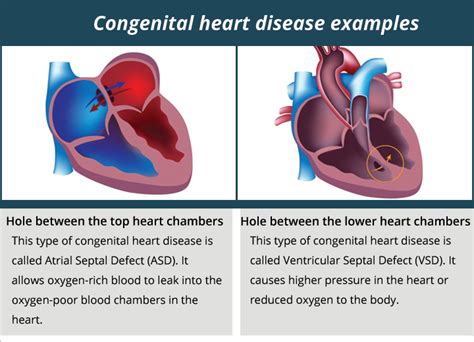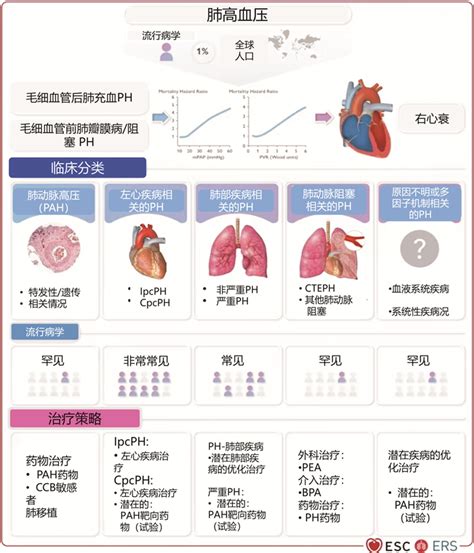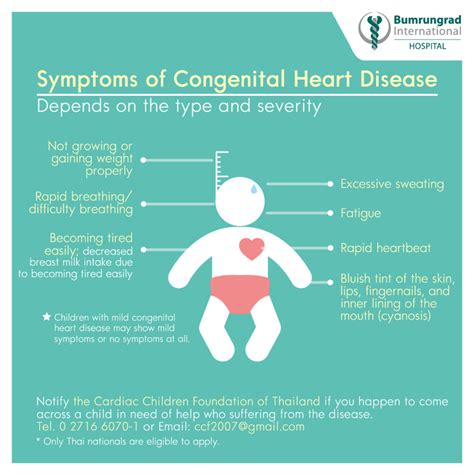Intro
Understanding ASD congenital heart disease, its symptoms, and treatment options, including atrial septal defect causes, diagnosis, and surgical repair, to improve heart health and overall well-being.
Congenital heart disease is a term that refers to a variety of heart defects that are present at birth. These defects can range from simple conditions that don't cause symptoms to complex problems that require surgical interventions. Understanding congenital heart disease is crucial for early diagnosis, treatment, and management, which can significantly improve the quality of life for affected individuals. The importance of this topic cannot be overstated, as it affects thousands of children and adults worldwide, making it one of the most common types of birth defects.
The prevalence of congenital heart disease underscores the need for comprehensive awareness and education. It's not just about the medical aspects; it's also about the emotional and psychological support that families and individuals need when dealing with such conditions. From diagnosis to treatment and long-term care, the journey can be complex and challenging. Therefore, it's essential to delve into the specifics of congenital heart disease, exploring its types, symptoms, diagnosis methods, treatment options, and the impact it has on individuals and their families.
The complexity of congenital heart disease lies in its varied forms and the different ways it can affect the heart. Some defects might involve the walls of the heart, the valves of the heart, or the blood vessels. The severity can vary widely, from defects that might not even be noticed until later in life to those that are immediately life-threatening and require emergency medical care at birth. The causes of congenital heart disease are not always clear, but they can include genetic factors, environmental factors, or a combination of both. Understanding these aspects is crucial for developing effective prevention strategies and for supporting research into the causes and treatments of congenital heart disease.
Understanding Congenital Heart Disease

Understanding congenital heart disease involves recognizing its various types, each with its own set of characteristics and challenges. For instance, atrial septal defects involve a hole in the wall between the heart's upper chambers, while ventricular septal defects involve a hole in the wall between the heart's lower chambers. Other types include patent ductus arteriosus, where a blood vessel used in fetal development fails to close after birth, and tetralogy of Fallot, a combination of four heart defects that can lead to oxygen-poor blood being pumped to the body. Each type of defect has its own set of symptoms and treatment options, ranging from monitoring and medication to surgery and other interventions.
Types of Congenital Heart Defects
The classification of congenital heart defects is based on the nature of the defect and its impact on the heart's function. Some defects affect the heart's ability to pump blood efficiently, while others might affect the flow of blood between the heart's chambers or to the rest of the body. Symptoms can vary widely and might include cyanosis (a bluish discoloration of the skin), shortness of breath, fatigue, and poor feeding in infants. In some cases, especially with milder defects, there might be no noticeable symptoms at all, and the condition could be discovered during a routine medical examination.Causes and Risk Factors

The causes of congenital heart disease are multifactorial, involving both genetic and environmental factors. Genetic factors can include inherited conditions or chromosomal abnormalities, such as Down syndrome, which increase the risk of congenital heart defects. Environmental factors might include the mother's exposure to certain substances during pregnancy, such as alcohol or tobacco, and infections during pregnancy, like rubella. Understanding these risk factors is crucial for preventive measures and for counseling families who have a history of congenital heart disease.
Genetic Counseling
Genetic counseling plays a significant role in the management of congenital heart disease, especially for families with a history of heart defects. It involves assessing the risk of recurrence in future pregnancies and discussing the options for prenatal diagnosis and testing. For some families, the risk of having another child with a congenital heart defect might be higher, and genetic counseling can provide valuable information and support in making reproductive decisions.Diagnosis and Treatment

Diagnosing congenital heart disease often involves a combination of physical examination, medical history, and diagnostic tests. A pediatrician or cardiologist might listen to the heart with a stethoscope to detect any abnormal sounds, such as murmurs, which can indicate a heart defect. Other diagnostic tools include echocardiogram (an ultrasound of the heart), electrocardiogram (ECG), chest X-ray, and in some cases, cardiac catheterization or MRI. The choice of diagnostic test depends on the suspected type of defect and the age of the patient.
Treatment Options
Treatment for congenital heart disease depends on the type and severity of the defect. Some defects might not require treatment and can be monitored over time, while others might need medication to manage symptoms or prevent complications. In many cases, surgical intervention is necessary, either immediately after birth for critical defects or at a later stage for less severe conditions. The goal of treatment is to improve the heart's function, reduce symptoms, and prevent future complications, such as heart failure or arrhythmias.Living with Congenital Heart Disease

Living with congenital heart disease requires ongoing medical care and lifestyle adjustments. Individuals with congenital heart defects need regular follow-up with a cardiologist to monitor their condition and adjust treatment as necessary. This might involve taking medications, following a specific diet, avoiding certain activities, or getting vaccinated against infections that could pose a risk to the heart. The emotional and psychological impact of living with a chronic condition should not be underestimated, and support from family, friends, and mental health professionals can be invaluable.
Coping Mechanisms
Coping with the diagnosis and management of congenital heart disease involves a range of strategies. For children, this might include explaining their condition in a way that is easy to understand, encouraging open communication about their feelings and concerns, and supporting their participation in activities that are safe and enjoyable for them. For adults, it might involve managing stress, maintaining a healthy lifestyle, and seeking support from others who have experienced similar challenges.Future Directions and Research

Research into congenital heart disease is ongoing, with scientists and clinicians exploring new diagnostic techniques, treatments, and preventive measures. Advances in genetics and genomics are helping to uncover the underlying causes of congenital heart defects, which could lead to more targeted and effective treatments. Additionally, improvements in surgical techniques and the development of less invasive interventions are offering new hope for individuals with complex heart defects.
Advances in Surgical Techniques
Surgical techniques for treating congenital heart disease have evolved significantly over the years, with a focus on minimizing invasiveness and promoting faster recovery times. This includes the use of minimally invasive surgery, robotic surgery, and transcatheter procedures that can repair or replace heart valves and close defects without the need for open-heart surgery. These advances have improved outcomes for many patients and have expanded the range of treatment options available.What is the most common type of congenital heart defect?
+Ventricular septal defects are among the most common types of congenital heart defects, involving a hole in the wall between the heart's two lower chambers.
Can congenital heart disease be prevented?
+While some risk factors for congenital heart disease cannot be changed, others can be managed. For example, preventing infections during pregnancy and avoiding harmful substances can reduce the risk of congenital heart defects.
What is the outlook for individuals with congenital heart disease?
+The outlook for individuals with congenital heart disease has improved significantly with advances in medical and surgical care. Many people with congenital heart defects lead active, healthy lives, although they may require ongoing medical care and monitoring.
In conclusion, congenital heart disease is a complex and multifaceted condition that affects individuals and families worldwide. Through increased awareness, ongoing research, and advancements in medical care, the future for those living with congenital heart disease looks more promising than ever. As we continue to learn more about the causes, diagnosis, and treatment of congenital heart defects, it's essential to support those affected and to advocate for further research and understanding. We invite you to share your thoughts, experiences, or questions about congenital heart disease, and to consider supporting organizations dedicated to improving the lives of individuals and families affected by this condition.
